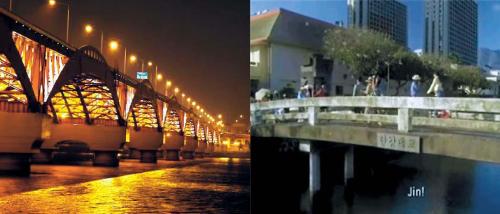‘U.S. dramas distort S. Korea image’
 | | The image of the Han River Grand Bridge in the U.S. television series “Lost” (left photo) and its actual appearance |
Many images of South Korea in hit American television series have been “distorted,” raising
concerns over their detrimental impact on the country’s overall image, a ruling
party lawmaker pointed out Thursday.
Rep. Hong Jung-wook of the Grand
National Party said that shows such as “Lost,” “24” and “Crime Scene
Investigation,” each of which has been watched by hundreds of millions of
people, including Koreans, have shown images that are far from
reality.
He made the mention during a parliamentary audit of the Foreign
Ministry at the National Assembly, offering a series of examples in which the
country was wrongly depicted.
One example is “Lost,” which has gained
much popularity here thanks to Korean-born actress Kim Yun-jin. In it, the Han
River, regarded as one of the iconic landmarks in the capital of Seoul, was described as a small stream in a village, the
lawmaker said. The 1-kilometer-long bridge over the river was shown as an old small bridge, he added.
In another scene, a
fishing village in Namhae, South Gyeongsang Province, was described as if it
were located in Southeast Asia. In the scene, there is a villager wearing a
traditional Vietnamese hat and a small sailboat, which can hardly be seen in
Korea given its shape and size, was also shown, Hong said.
Also in the
television series, a person seen drinking soju, a traditional Korean alcoholic
beverage, uses a glass different from the typical Korean glass for the drink.
Korean houses and Buddhist temples were also different from those commonly seen
here.
“In short, it was a mix-up of elements from China, Japan and Southeast Asia,” said Hong in a press release.
In the TV series “24,” a scene where a person suffers harsh torture
in Seoul is shown, which could tarnish the overall image of the capital city
even though it was a fictional one, Hong said.
In “CSI,” there was a scene of a Korean community in the United
States where a North Korean song regarding an allegiance to the communist
state’s ruling Workers’ Party was played as background music.
“Given the
enormous impact of popular culture, the images that people have about South
Korea will be more similar to those represented in the popular culture rather
than images related to the hosting of the Group of 20 summit or the exporting of
the nuclear reactors,” Hong said.
“The Foreign Ministry has underscored
superficial ‘soft power diplomacy’ and ‘culture diplomacy.’ However, it needs to
make substantial efforts to leave a good national image in the minds of the
world’s people.”
An Bo-seob, professor of public relations and
advertising at Sookmyung Women’s University, said the country could utilize Hallyu, the
pan-Asian popularity of Korean culture, to promote the positive image of the
country.
“People abroad vicariously experience Korea through the dramas.
Thus, the dramas play a crucial role in making images of a country for the
general public,” he said.
“It would be efficient for us to highlight the
advancement and development our nation has achieved through Hallyu as it would
be difficult for us to review their synopses (before the dramas are aired).”
By Song Sang-ho (sshluck@heraldm.com)
|
|

